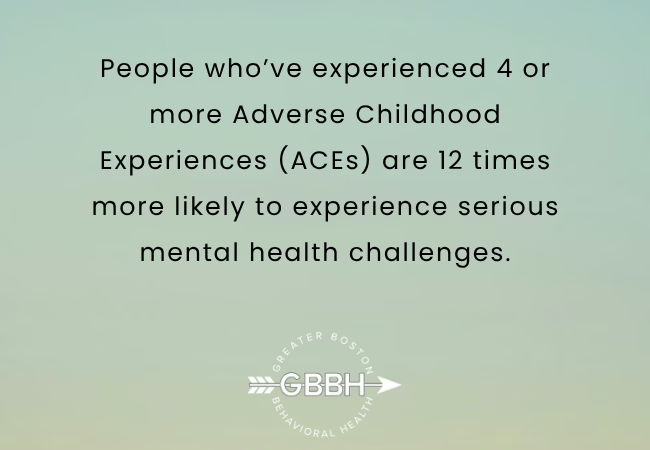Anger is a powerful emotional response—sometimes protective, sometimes destructive. But when anger becomes intense, frequent, or unpredictable, it may not be about the present moment at all. Often, unresolved trauma lies at the root.
You don’t just “have a short fuse.” You’re not simply “overreacting.” If your anger feels overwhelming, unpredictable, or deeply rooted, there’s often something more beneath the surface: unresolved trauma.
Many people carry invisible wounds from their past—childhood abuse, loss, neglect, violence, or emotional abandonment. And for countless individuals, that unresolved pain doesn’t just vanish—it transforms into rage, irritability, or emotional shutdown. Without realizing it, you may be reliving old trauma every time you explode over something small.
At Greater Boston Behavioral Health, we understand that anger is often a symptom—not the root issue. That’s why our trauma-informed mental health programs in Massachusetts are designed to help you uncover the source, understand the patterns, and begin to heal—not just manage—your emotions.
In this blog, we’ll explore the powerful connection between trauma and anger, how it affects the brain, and the treatment paths—like our Partial Hospitalization Program in Massachusetts and Intensive Outpatient Program (IOP)—that offer real solutions for lasting peace.
What Is Trauma—and How Does It Influence Anger?
Trauma is the psychological response to deeply distressing or disturbing events. It could stem from:
- Childhood abuse or neglect
- Physical or sexual assault
- Domestic violence
- Loss of a loved one
- Natural disasters or accidents
- Military combat or repeated exposure to violence
When trauma goes unresolved, the nervous system remains on high alert, interpreting everyday frustrations as threats. The result? Overreactions, emotional dysregulation, and explosive anger.
Signs Your Anger May Be Trauma-Related
- You overreact to small triggers
- You feel out of control during outbursts
- You experience guilt or shame after angry episodes
- You’ve suppressed or avoided processing past trauma
- You struggle to trust others or feel safe emotionally
These signs often indicate that anger is a symptom—not the problem.
The Science Behind Trauma and Emotional Dysregulation
Trauma affects the brain’s limbic system, particularly the amygdala (threat detection) and prefrontal cortex (rational thinking and regulation). After trauma:
- The amygdala becomes hyperactive, causing you to perceive danger where none exists.
- The prefrontal cortex underfunctions, making it harder to think through your responses.
- The body remains in fight-or-flight mode, leading to chronic irritability and reactivity.
This biological feedback loop makes it very difficult to manage anger without targeted mental health treatment.
How Unresolved Childhood Trauma Shapes Adult Anger
Childhood is a critical period for emotional development. When trauma—such as emotional neglect, physical abuse, bullying, or witnessing domestic violence—goes unresolved, it creates a distorted emotional template that often manifests in adulthood as chronic irritability, explosive anger, or emotional numbness.
Common adult behaviors linked to childhood trauma:
-
Passive-aggressive communication
-
Low frustration tolerance
-
Difficulty trusting others
-
Overcompensating through control or dominance
-
Intense reactions to perceived disrespect
At our Mental Health Treatment Center in Massachusetts, we often see clients who didn’t realize their anger was rooted in early attachment wounds or adverse childhood experiences (ACEs). Our trauma-informed clinicians help them uncover, understand, and heal these deep-seated emotional injuries—safely and compassionately.
Self-Awareness Tools to Recognize Trauma-Driven Anger
Before anger can be changed, it must be understood. Self-awareness is a key starting point in breaking trauma-related behavior patterns.
Here are tools and practices that can help:
-
Anger Journaling – Track moments of anger, their triggers, and emotional intensity.
-
Body Scanning – Identify physical signs of anger (e.g., clenched jaw, racing heart) to intervene early.
-
Mindfulness Meditation – Learn to observe your emotions without reacting impulsively.
-
Therapeutic Timelines – In therapy, map your life events to see how past pain connects to present anger.
-
Trigger Mapping – Work with a counselor to identify what situations most often cause intense emotional responses.
These techniques are introduced and reinforced in both Intensive Outpatient Programs (IOPs) and Partial Hospitalization Programs (PHPs) at Greater Boston Behavioral Health, ensuring that clients are equipped with both insight and practical strategies for real-life situations.
How Therapy Heals the Trauma-Anger Cycle
At Greater Boston Behavioral Health, we use a trauma-informed approach to help clients break free from this cycle.
Our therapeutic methods include:
- Cognitive Behavioral Therapy (CBT): Identify and challenge distorted thinking that fuels anger.
- Dialectical Behavior Therapy (DBT): Develop emotional regulation, mindfulness, and distress tolerance.
- Eye Movement Desensitization and Reprocessing (EMDR): Process traumatic memories without re-traumatization.
- Group Therapy: Connect with others who’ve experienced similar struggles.
- Somatic Therapy: Release stored trauma from the body using physical awareness techniques.
These therapies are available across various levels of care—from Intensive Outpatient Programs (IOP) to Partial Hospitalization Programs (PHP) and Inpatient Treatment Programs in Massachusetts.
Trauma, Anger, and Co-Occurring Disorders
Trauma and anger issues often exist alongside other mental health conditions such as:
- Depression
- Anxiety disorders
- PTSD
- Borderline personality disorder
- Substance use disorders
Our comprehensive mental health programs in Massachusetts address all aspects of a person’s emotional well-being—not just the surface-level symptoms.
Which Treatment Path Is Right for You?
Partial Hospitalization Program (PHP)
Best for individuals needing daily support but not 24/7 inpatient care. Offers trauma-focused therapy, anger management, and structured healing.
Intensive Outpatient Program (IOP)
Ideal for those balancing treatment with work or family life. Focuses on emotional regulation and trauma recovery while promoting independence.
Residential/Inpatient Programs
Recommended for severe or chronic trauma, especially when co-occurring disorders (like substance use or suicidal ideation) are involved.
At our Mental Health Treatment Center in Massachusetts, we help determine the most appropriate level of care for each client based on their clinical needs and goals.
Real Client Outcomes: Healing the Root, Not Just the Rage
Many of our clients come to us feeling ashamed, isolated, or resigned to their anger. Through trauma-informed care, they begin to:
- Understand the origins of their reactions
- Develop safer, healthier coping mechanisms
- Rebuild trust in relationships
- Regain a sense of peace, clarity, and control
The result is not just fewer outbursts—but a fundamental transformation in how they feel, think, and live.
Ready to Heal? We’re Ready to Help.
Unresolved trauma doesn’t just disappear—and neither does the anger it often creates. But with the right care, you can release the pain of the past and reclaim your future.
At Greater Boston Behavioral Health, our team of trauma-informed clinicians will guide you every step of the way with compassion and expertise. Call us at 888.278.0716 to learn how our mental health and anger management therapy programs in Massachusetts can help you break the cycle and begin again—stronger, calmer, and truly free.
Frequently Asked Questions (FAQ)
Can trauma really cause long-term anger issues?
Yes. Trauma, especially unresolved childhood trauma, often leads to chronic anger as the brain remains in survival mode. Therapy helps calm the nervous system and reprocess painful memories.
What types of therapy are best for trauma-related anger?
Effective approaches include Cognitive Behavioral Therapy (CBT), Dialectical Behavior Therapy (DBT), EMDR, and somatic therapies. These are available through our IOP and PHP programs.
How do I know if my anger is trauma-related?
If your reactions feel intense, out of proportion, or tied to past experiences, it may be trauma-based. Therapy can help you explore this in a safe, structured way.
Will I need inpatient treatment for trauma and anger?
Not always. Our team evaluates each client to determine the best fit—whether it’s a Partial Hospitalization Program in Massachusetts, Intensive Outpatient Program, or another level of care.
Is help available even if I’ve struggled with this for years?
Absolutely. Healing is possible at any stage of life. Our Mental Health Treatment Center in Massachusetts provides trauma-informed care tailored to your story.


